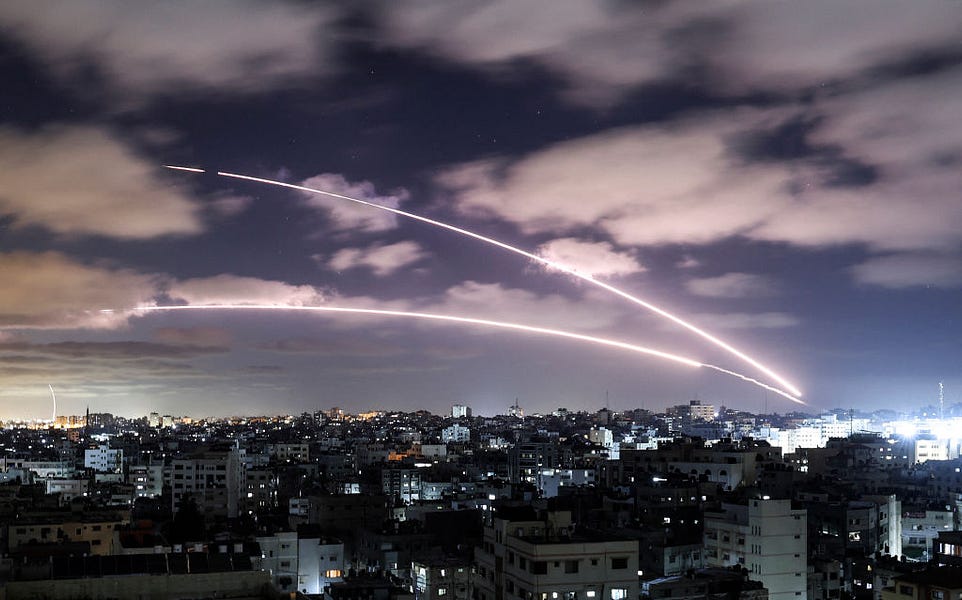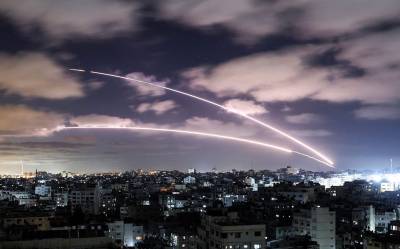As violence between Israel and Tehran’s terror proxies in Gaza continues, President Joseph Biden used a call with Israeli Prime Minister Benjamin Netanyahu on Wednesday to reiterate his desire for a ceasefire. Given the human suffering over the last week, calls for a cessation of violence are certainly understandable.
But when applying that virtuous impulse to the situation in Israel and Gaza, honest observers should reject suggestions of moral equivalence between Israel and terrorist groups, while recognizing that inflicting additional damage on terrorist groups now may save more Israeli and Palestinian lives in the long run.
False equivalence.
As often happens in Israel’s conflicts with terrorist groups in Gaza, some international observers have explicitly or implicitly suggested a moral equivalence between the two sides. But such a suggestion does not stand up to scrutiny.
On one side, you have Hamas and Palestinian Islamic Jihad (PIJ). For good reason, the U.S. government has designated both as foreign terrorist organizations. In just 10 days, these terrorist groups launched more than 4,000 rockets toward Israel in an effort to kill civilians. These rockets are not precise weapons of war but rather tools of terror.
And to make matters worse, as in previous conflicts, Hamas and PIJ have deliberately put Palestinian civilians in harm’s way by often placing command and control nodes, terror tunnels, rocket factories, and launch sites under, in, or adjacent to civilian structures such as homes, hospitals, and schools. Hamas and PIJ hope that using the people of Gaza as human shields will prevent Israeli attacks or invite civilian casualties that can then be blamed on Israel. The goal is to further a global information warfare campaign designed to demonize and isolate Israel.
This battlefield behavior by Hamas and PIJ, however, stands in stark contrast to the behavior of the Israel Defense Forces (IDF).
In response to thousands of rockets being launched at its citizens, Israel could have just played defense in hopes of intercepting all the rockets destined for Israeli towns and cities. But no government and no military in the world would be satisfied with such a passive and defensive approach if they possessed the means to better protect its citizens.
When jihadist terrorists used commercial planes as missiles to kill Americans on 9/11, the United States traveled all the way to Afghanistan to hold the perpetrators accountable and ensure they lacked the ability launch additional attacks. It would be an odd argument, indeed, to suggest that Israel does not have a similar right to take offensive action to prevent additional attacks on its citizens. And that is exactly what Israel has done.
If the IDF shared Hamas’ and PIJ’s disregard for innocent life, the IDF could have applied a scorched-earth policy in Gaza. But Jerusalem has not done so. Instead, when civilians might be hurt in an upcoming IDF strike against Hamas or PIJ, the IDF has a practice of notifying civilians in advance so they have time to get to safety. And the IDF will often employ additional tactics just before the strike occurs to give civilians one last opportunity.
By providing advance warning, Israel accepts the fact that some terrorists will escape—but Jerusalem is willing to accept such a cost to minimize civilian lives. Hamas and PIJ—who methodically seek to kill the innocent—do not take similar measures when it comes to their strikes on Israel.
Many respond to these facts by highlighting the systemic political and economic challenges confronting Palestinians. But it would be morally depraved to suggest that such challenges justify efforts by jihadist terrorist groups to mass murder Israelis.
In response to arguments rejecting any moral equivalence between Israel and terrorist groups, others highlight the relative death tolls—noting that far more Palestinians have been killed than Israelis. Each civilian death is a genuine tragedy. The images of children killed are particularly heart-wrenching. But comparing death tolls to suggest relative moral culpability is deeply misleading and even cynical given the distinct actions and intentions of the two sides.
If it were not for Israel’s Iron Dome air defense system and the prevalence of bomb shelters in Israel, launching thousands of rockets at Israeli cities and towns would have killed hundreds or, more likely, thousands of civilians. Does the fact that Israel has developed the means to defend itself more effectively against such rocket attacks change the moral depravity of Hamas and PIJ in deliberately launching rockets at civilians? They are attempting to murder thousands of civilians and are failing only because of the efforts of others.
As anyone who has served on a jury or watched a legal thriller knows, motives matter when it comes to the law. When someone is killed, we rightly spare no expense in investigating whether the killing was accidental or premeditated. We agree that deliberately taking an innocent life is particularly heinous and worthy of far more condemnation than one who accidently takes a life despite extensive precautions to avoid such an outcome.
And every indication is that the IDF—like the U.S. military—takes extraordinary measures to avoid civilian casualties. Yet individuals who pride themselves on human rights and basic fairness sometimes seem happy to suspend this fundamental principle of law when it comes to Israel’s efforts to defend itself against terrorist attacks.
Accordingly, as leaders pursue a ceasefire in the coming days, they should see the character of the respective combatants clearly and avoid any suggestion that terrorist groups deliberately trying to kill civilians are morally equivalent to those who take extraordinary steps to protect innocent life.
Next time?
In addition to questions of culpability, there is also the question of how and when to end the conflict. Given the images coming out of Israel and Gaza, people of goodwill instinctually want the violence to end without delay. But the best way to reduce such violence over the long-term is to deprive terrorist groups of the means to kill civilians—rather than demanding that besieged democracies stop their efforts to defend their citizens.
Ending the conflict sooner may not necessarily decrease the overall suffering of Israelis and Palestinians in the coming months and years. Let us explain.
In this conflict, Hamas and PIJ have launched a higher volume of rockets at Israel than in previous conflicts, and a greater percentage of the rockets have been launched long-range toward Tel Aviv and other Israeli population centers. The terror groups targeted Jerusalem with rockets for the first time since 2014. They have also employed drones, unmanned underwater vehicles, anti-tank guided missiles, and new types of rockets. It takes time for the IDF to destroy the infrastructure, including a massive underground complex, that permits these terrorist groups to import, build, and employ these weapons.
A few more days of attacks on Hamas and PIJ, while assiduously avoiding civilian casualties, might decrease overall suffering in Gaza and Israel by extending the peaceful interlude before the next conflict. That’s because additional damage to their terrorist capabilities will force the terror groups to take longer to reconstitute forces, render them less effective in killing civilians in the next conflict, and make them think twice before starting the next missile barrage at all.
It is also important to remember that Hezbollah and Tehran are watching, and they are far more capable adversaries. In fact, Iran has funded, trained, and equipped terrorist groups in Gaza. Tehran and its terror proxies must not be left with the impression that they can launch thousands of rockets at Israel and pay a relatively light price. Otherwise, we will see more of the same in the future, and that will mean more casualties among both Israelis and Palestinians or a wider war involving Iran’s proxies in Lebanon and Syria. The more serious a blow the IDF can deliver to Hamas and PIJ, the stronger the deterrent message it will send to those groups as well as Hezbollah and Tehran.
So, let’s hope that hostilities end soon and that civilians will be spared from the violence. But let’s also reject cynical suggestions of moral equivalence between Israel and terrorist organizations, while recognizing that the best way to protect the innocent over the long term is to deprive terrorists of the means to commit murder.
Bradley Bowman is senior director of the Center on Military and Political Power at the Foundation for Defense of Democracies. Seth Frantzman is the senior Middle East correspondent for The Jerusalem Post and author of Drone Wars: Pioneers, killing machines, artificial intelligence and the battle for the future.






Please note that we at The Dispatch hold ourselves, our work, and our commenters to a higher standard than other places on the internet. We welcome comments that foster genuine debate or discussion—including comments critical of us or our work—but responses that include ad hominem attacks on fellow Dispatch members or are intended to stoke fear and anger may be moderated.
With your membership, you only have the ability to comment on The Morning Dispatch articles. Consider upgrading to join the conversation everywhere.